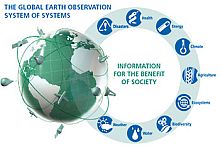Dr Bob Scholes to chair global Biodiversity Observation Network
|
Dr Bob Scholes, one of the driving forces behind the creation of SAEON and a former member of SAEON’s Technical Steering Committee, has been appointed the first chair of the newly established steering committee of the Group on Earth Observations’ Biodiversity Observation Network (GEO BON).
South Africa is one of the leaders of the Group on Earth Observations (GEO), an international body of 80 countries and about 100 organisations dedicated to improving the flow of information essential for the wise management of the planet.
One of the nine GEO focus areas is biodiversity, a term that encompasses the variety of life at all scales - from genes, through species, to ecosystems.
GEO charged DIVERSITAS (an international body that coordinates biodiversity research) and NASA to catalyse the formation of a network of organisations that have or need biodiversity-related information. The steering committee of the resulting Biodiversity Observation Network (GEO BON) met for the first time in Geneva from 22 to 23 June and appointed Scholes as its first chair.
Scholes has been involved in global information systems and earth observation for over a decade, having helped design the Global Terrestrial Observing System (and chairing it from 2003-2006) and the Global Earth Observation System of Systems . He was the lead author of a recent paper in the prestigious journal Science laying out a vision for a biodiversity observation system, and one in Nature in 2004 describing a general index of biodiversity status.
According to Scholes, the role of the GEO BON is to help coordinate the many partial systems that exist for collecting and disseminating biodiversity data into a coherent whole that delivers the information needed to stem the catastrophic worldwide loss of biodiversity.
”We will need to identify gaps in the system, and advocate that they be filled,” Scholes explains. “Much of the work involves acting as a broker or translator between researchers who have biodiversity data and decision-makers who need it, and between currently incompatible information systems.”
Early products of the GEO BON will be demonstrated at the GEO plenary meeting in Washington DC in November 2009. The implementation plans of the eight task groups that have been formed will be ready in April 2010, in time for the meeting of the science advisory body to the Convention on Biological Diversity (CBD), which reports to the crucial CBD Conference of Parties in November 2010.
According to Scholes it is anticipated that progress towards reducing the rate of biodiversity loss, a target for 2010, will be disappointing, partly because the information to evaluate progress is so weak.
“GEOBON is a step towards fixing that problem,” says Scholes.
View Scholes’s presentation on the GEO BON concept.
Source: CSIR Communications












